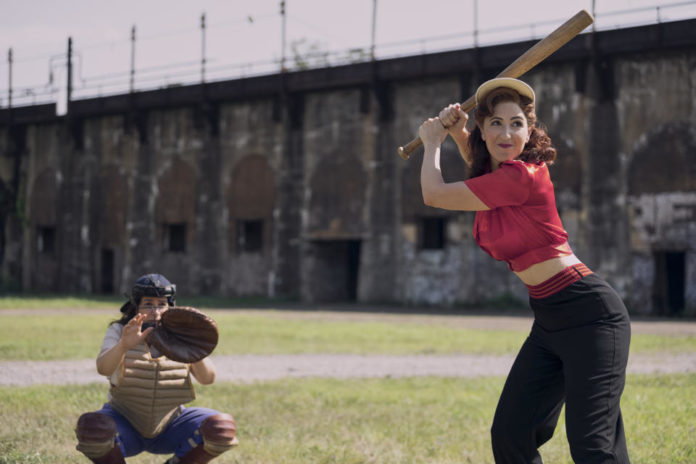Penny Marshall’s 1992 baseball blockbuster, A League of Their Own, has long been an uncontested member of the sports movie Hall of Fame for bringing to life the World War II-era All-American Girls Professional Baseball League. But the film is also a landmark title in the history of LGBTQ cinema — even if none of its characters are openly gay. “It’s an iconic gay film,” confirms comedian Abbi Jacobson, who co-created and stars in Prime Video’s new streaming series based on the movie. “Like no one’s gay, but maybe they are! You don’t know what’s really going on, but you feel that. I think a lot of queer people feel a connection to that film.” (Watch our video interview above.)
Unlike its predecessor, Jacobson’s take on A League of Their Own isn’t at all ambiguous about telling queer narratives. Premiering on Prime Video on Aug. 12, the show is ultimately a coming out story for its two central characters, Carson (Jacobson) and Max (Chanté Adams). And Jacobson says that was always part of the pitch that she and fellow creator, Will Graham, made to the streaming service. “We were always about expanding this lens and showcasing a generation of women playing baseball, and also showcasing the queer stories that were not told in the film. Max and Carson are really the hinge of this show, and ping pong back and forth between these two worlds as they’re going through very different journeys on the field.”
Carson, for example, begins her journey as a married woman whose soldier husband is off at the front. A baseball fan from way back, she decides to try out for the Rockford Peaches — one of the founding AAGPBL teams. She quickly scores a place on the team… and also scores with her glamorous teammate, Greta (D’Arcy Carden), who stirs up feelings inside Carson that she’s previously pushed away. Their romance becomes the beating heart of the show, and reveals the lengths that lesbian women at the time had to go to keep their true selves secret from the prying public eye.
Off-screen, Carden and Jacobson have been good friends for years, and The Good Place star says that they drew on that shared relationship for their onscreen romance. (In real life, Carden is married to producer Jason Carden, while Jacobson is in a relationship with actress Jodi Balfour.) “When we talked about me playing Greta, Abbi was like, ‘They’re going to be girlfriends and we’re going to kiss,'” Carden remembers, laughing. “And we were both like, ‘Great!’ We have this decades-long relationship to build off of and can bring that chemistry to the show. The Greta and Carson [relationship] is so beautiful and heartbreaking.”
As a Black woman navigating pre-Civil Rights era America, Max’s journey comes with additional complications beyond what Carson experiences. Despite being a skilled pitcher, she’s denied the opportunity to try out for the all-white AAGPBL, while her gender keeps her off of the line-up of the local all-male Negro League team. Even though she has a boyfriend, Max wrestles with her attraction to women — feelings that snap into focus when she stumbles upon a long-hidden family secret. Her estranged aunt, Bertie (Lea Robinson), has been passing as a man for years, and that discovery leads Max to experiment with her own gender identity, subtly exploring a trasngender existence well before that word was popularized.
“Her journey is about finding out who she is,” Adams says. “At first, she’s trying to be what everyone else wants her to be… but when Uncle Bertie comes into her life, and decides, ‘You’re like me,’ Max is like, ‘OK, let me dip my toe over there.’ In the end, we have this beautiful story that’s told through costuming. Costume designer Trayce Gigi Field did an amazing job with Max, taking a little piece of both of those worlds and creating who she is. I think that’s really pivotal to her story and her journey.”
Even though there are elements of the transgender experience in Max’s story, Graham and executive producer Desta Tedros Reff are quick to note that the character herself wouldn’t identify as trans. “It’s a queer story, not specifically a transgender story,” Reff explains. “Max is on her own journey of queerness, and sort of seeing what parts of her fit and feel true and what parts don’t quite fit. I think that’s true with anybody who is stepping into the confidence of being yourself.”
For his part, Graham says that Max and Bertie “see mirrors in each other” even if their journeys ultimately lead them to separate destinations. “What’s interesting about writing about this time period from a queer perspective is that there wasn’t a lot of vocabulary,” he adds. “You made the community that you were lucky enough to find. Max and Bertie are not quite the same, because that’s part of what happens. We want to find people like us, and sometimes it can lead us to think that people are a little more like us than they actually are.”
Graham wrote and directed the sixth installment of the eight-episode series, which features the return of popular Rockford Peaches alum Rosie O’Donnell. The out gay actress and comedian played fan favorite third base player, Doris Murphy, in the 1992 film and has said over the years that she interpreted her character as gay, even though Marshall reportedly didn’t agree. In this new League, O’Donnell plays Vi, the owner of a LGBTQ-friendly bar where some of the Peaches congregate in secret after dark.
“I think it meant a lot for her to come back and be able to do that,” Graham says of giving O’Donnell the opportunity to play an out gay character three decades after the movie. “She’s been very open talking about her experience on the film, knowing that her character was queer and having conversations with Penny where it was like, ‘We can’t do that too openly.’ In hearing what we were planning, she pitched to us what she wanted to do, and of course we said, ‘That’s the most amazing thing in the world.'”
The cast relished having a former Peach on set as well. “Rosie walked into the room, and said ‘Hey, you’re the me!'” recalls Melanie Field, who plays Greta’s vivacious best friend, Jo. “That was the first thing out of her mouth — I nearly passed out. She’s an iconic figure from that movie, and to have her blessing meant the world. The fact that she was so integral in the gay storyline was cool for us, too.”
The sixth episode ends with Vi’s bar being raided by police and Carson and Greta just barely avoiding capture. It’s a sequence that reveals the harsh realities facing gay men and women at the time, where discovery often resulted in public shaming and even violence. (In fact, Vi is glimpsed being beaten by police as her customers flee.) Graham says that the raid is rooted in the real experiences of AAGPBL players that he and Jacobson spoke with, many of whom were forced to keep their sexuality a secret at the time.
“They told us stories of sneaking out to bars and barely escaping raids,” he remembers. “It was a reality of life for all kinds of queer people at the time, and is still a reality for people in many parts of the world now. We wanted to show how important it was for Carson to find this space that seemed so magical to her, but also how tenuous that can be. It shows both the rewards of taking that risk and the potential consequences. What was inspiring to me, though, was that despite the raids and despite the consequences, people still found their community and still broke through to be their authentic selves.”
O’Donnell’s cameo isn’t the only callback to the big-screen League. In the fifth episode, the Rockford Peaches recreate Tom Hanks’s famous “There’s no crying in baseball” moment that remains one of the most oft-quoted sports movie scenes ever. In this case, the cryer in question is none other than Jacobson herself, and the star admits that she and Graham wrestled with when and how to incorporate the classic exchange into the show. “We wanted to do it in a different way,” she says. “Once we found it, it really felt right to do it in the way we did it, like a lot of the nods we make to the film.”
In place of Hanks, Roberta Colindrez and Kelly McCormack step up to the plate to admonish Jacobson for shedding tears. As the scene plays out, Carson’s waterworks start after a rough exchange with Rockford’s pitcher-turned-coach, Lupe (Colindrez), who asks her: “What’s wrong with your face? Are you crying?” At that point, rough and tumble shortstop Jess (McCormack) jumps in and reminds everyone that there’s no crying in baseball.
While following up Hanks’s home run delivery might seem intimidating, both actresses say that they were careful not to psych themselves out before filming their version. “I didn’t practice it,” McCormack insists, adding that she only did two takes of her signature line. “I wasn’t gonna go full Tom Hanks — I was just going to say the line and be done with it.” Adds Colindrez: “Jess and Lupe are on the same page: If there were ever two people who believed there was no crying in baseball, it would be us. At the same time, it was terrifying and I’m glad it’s done!”
Asked whether they hope to score a thumbs up from Hanks — who is active on social media — the duo nearly start tearing up themselves. “I’m tripping,” McCormack says, laughing. “I was ill recently and I watched Sleepless in Seattle again, and Tom Hanks is so effervescent in that. I’m so stressed out now!” Hey… there’s no crying in getting a Hanks shout-out.
A League of Their Own premieres Friday, Aug. 12 on Prime Video.
Watch the trailer:








